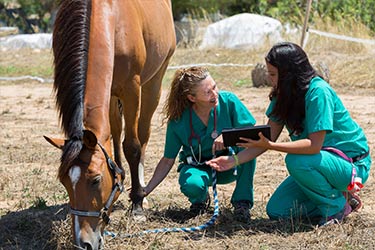Veterinarian Tips: New Equine Deworming Strategies

To keep their animal from being affected by the types of health problems caused by internal parasites, horse clients have commonly turned to the practice of rotational deworming. Since this has long been considered to be a solid choice for keeping internal parasites under control, clients may not be aware of another way that better meets the deworming needs of a horse.
Establishing an Equine Deworming Program
A successful deworming program may lose its effectiveness due to reasons that involve:
- Continuing reinfection
- Use of a deworming agent that only removes the adult worms
- Improperly used deworming agent
- Drug-resistant worms.
To continually provide protection against internal parasites, clients need to evaluate the effectiveness of their deworming method by considering:
- Are all animals dewormed at the same time and at regular intervals?
- When left untreated, these animals will continue to contaminate their environment, increasing the opportunities for reinfection
- Are the deworming agents being administered properly?
- To be effective, the dosage must:
- Be designed to eliminate the specific parasites infecting the animal
- Be administered correctly via package or veterinarian’s directions
- Be given in the proper dosage
- Supplying the appropriate dosage amount is determined by the weight and age of the animal
- If not, and the amount given is:
- Too little, some worms will survive causing the animal to remain infected and able to continue to contaminate the environment
- Too high, the animal may be harmed as anthelmintics are considered toxic
- To be effective, the dosage must:
- If having continued problems with internal parasites, is it due to the development of drug-resistant worms?
- Resistance to worming medication allows for the parasite’s continued survival and reproduction
- Does the program determine the deworming needs based upon information gathered from the routine use of fecal egg count test results?
- Fecal egg count tests will identify not only the type of parasites infecting the horse, but also the animal’s level of infection.
Rotational Deworming vs. Strategic Deworming
When clients rely only on a rotational deworming method, they may be limiting the effectiveness of their program. In rotational deworming, the idea is to deworm an animal every 6 to 8 weeks, rotating between different deworming agents. It is now felt that relying solely on a rotational deworming practice will increase the risk of:
- Further internal damage caused by treating the animal with a deworming agent that is inappropriate for its type of/or stages of parasites
- Continued environmental contamination with parasite eggs and larvae
- Possibility for overtreating certain animals with medications they don’t need
- Developing a resistant worm population.
Developing a strategic deworming protocol focuses on the needs of each individual horse, and requires:
- Information:
- Date of last deworming
- Name of the deworming agent used
- Age of the horse
- Fecal egg count test report:
- Count will be based on the number of eggs per gram (EPG) of feces
- Requires:
- ▪A fresh manure sample, typically two manure balls, placed in a sealed and air-tight bag, and refrigerated
- The findings of the fecal egg count test will be used to:
- Identify the animal’s parasite load
- Place the animal into one of three parasite egg-shedding classes:
- Low shedder: animal has a fecal egg count of <200 EPG
- Moderate shedder: fecal egg count ranging from 200-500 EPG
- High shedder: fecal egg count >500 EPG
- ●Deworming schedule:
- Determining a schedule for deworming is based upon the needs of the individual horse as determined by the findings of the fecal egg count test
- The schedule will involve:
- Choosing the appropriate deworming agent(s)
- Determining the times for deworming. For example:
- Low shedder class: deworm 2 times per year
- Moderate shedder class: deworm 3 times per year
- High shedder class: deworm 4 times per year.
Benefits provided by changing to a strategic deworming plan based on information obtained from fecal egg count testing include:
- Targets the specific parasites infecting an animal and effectively increases their control
- Decreases the annual number of deworming applications
- Saves money
- Slows the development of parasitic resistance.
If left untreated, internal parasites can cause a horse to suffer from serious health problems. Equine clients will benefit not only from hearing how a fecal egg count test can determine whether their deworming program is working, but also how implementing its use with a strategic deworming program will better fit their animal’s needs.
Your Covetrus representative has additional information available to pass along to equine clients. Contact us online or at 855.724.3461
Sources:https://extension.tennessee.edu/VanBuren/Documents/ANR/Parasite_whitesheet_r1.pdf
http://www.horsechannel.com/horse-health/new-thinking-on-deworming.aspx
Need Regulatory Assistance
If you need help with regulatory or licensing issues, we're happy to help. We have a wide variety of resources to help you when issues arise.

Careers
Are you looking for a place to let your talents shine? At Covetrus, we help our practitioner customers better serve their patients and take pride in providing the best customer experience possible. Search our open positions to see our available opportunities.
Newsletter
Stay current with what’s going on with Covetrus, subscribe to receive our newsletter and email communications. Subscribers will receive the latest information in practice management, sales and marketing, animal health, and more.


Leave a comment